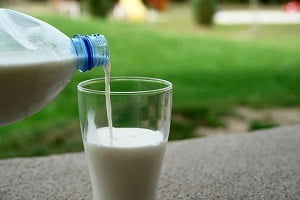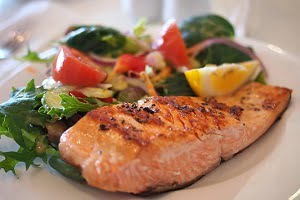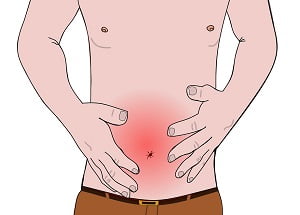Risks of Raw Milk Food Poisoning
- Updated on: Jul 6, 2024
- 3 min Read
- Published on Nov 20, 2020

Milk and dairy products are healthy and nutrient-rich foods because they contain nutrients like calcium, vitamin D, protein, and other essential nutrients that are useful for our body. However, consuming unpasteurized or raw milk can lead to food poisoning because it consists of various harmful microbes.
How Does Raw Milk Cause Food Poisoning?
Unpasteurized milk obtained from animals like cows, sheep, or goat is called raw milk. Pasteurization is when liquids are boiled at a specific temperature to kill harmful microbes present in it. Raw milk contains harmful microbes like Listeria monocytogenes, Escherichia coli, Campylobacter, and Salmonella, leading to food poisoning. Consuming raw milk may result in many infections, including the following:
Listeriosis
Listeria monocytogenes is a common microbe found in unpasteurized milk and soft cheese. It can survive in low temperatures and therefore can withstand refrigerators. Food poisoning caused due to listeria infections (listeriosis) can be dangerous to all individuals, especially pregnant women and people with chronic diseases. Listeriosis infections in pregnant women may lead to miscarriage, premature birth, and stillbirth, even if they might not feel sick.
Campylobacter Infections
Campylobacter bacteria are found in raw milk and other animal products. When you consume food contaminated with these bacteria, you may develop food poisoning followed by bloody diarrhea and abdominal cramps. Campylobacter infections caused due to consumption of raw milk increase the risk of food poisoning by neutralizing the stomach acids, which in turn allows bacterial growth.
Escherichia Coli Infections
One strain of Escherichia coli O157: H7 causes food poisoning and leads to developing symptoms like bloody diarrhea, vomiting, nausea, and fever. It is also found in raw milk, dairy products, and soft cheese. These bacteria may also cause other complications such as hemolytic uremic syndrome and kidney damage.
Salmonella Infections
Salmonella bacteria are found in raw milk and dairy products. The symptoms associated with this infection may include diarrhea, vomiting, and high fever.
Yersinia Infections
Yersinia enterocolitis is generally present in raw milk, unpasteurized dairy products (like ice creams), and soft cheese. Infections caused by these bacteria may lead to diarrhea, abdominal pain, vomiting, and fever.
Bacillus Cereus Infections
Bacillus cereus is a spore-forming bacteria that release toxins and can be found in raw milk and its products. Consuming raw milk contaminated with spores of Bacillus cereus may lead to serious food poisoning. The Bacillus spores are heat resistant and cannot be destroyed even after pasteurization.
Read About People With Higher Risk of Food Poisoning
Who Is at Greater Risk of Raw Milk Food Poisoning?
Following are some of the people who are at a high risk of raw milk food poisoning:
- Babies and young children up to 5 years of age
- Pregnant women
- Adults older than 65 years age
- People who have some other diseased conditions such as cancer, diabetes, kidney disorders and are taking immunosuppressive medications
How to Reduce the Risk of Raw Milk Food Poisoning?
Following practices can be adopted to reduce the chances of infections caused by consuming raw milk:
- Avoid drinking raw milk and try to consume only pasteurized milk and dairy products.
- Read the milk and dairy products’ labels carefully before purchasing because many food stores sell unpasteurized dairy products.
- Allow the milk to boil properly before consumption to kill the microbes present in raw milk.
- Purchase only milk and dairy products that are sterilized and pasteurized.
- Use dairy and milk products before the expiry date.
- Avoid consuming soft cheeses because it is mostly prepared from unpasteurized milk.
- Pregnant women should avoid consuming raw milk and its products because they can get listeria infections, which can lead to miscarriage.
- Do not leave milk products outside the refrigerator for more than 2 hours.
FAQs
Can You Get Sick From Drinking Raw Milk?
Raw milk contains harmful bacteria like Listeria, Campylobacter, and E.coli, which can cause food poisoning. This make you feel sick and you may also experience diarrhea, vomiting, nausea, fever, and abdominal cramps. Raw milk is one of the abundant sources of food poisoning.
Does Boiling Raw Milk Make It Safe?
Yes, boiling raw milk can make it safe. It is always an effective way to deal with the microorganisms present in raw milk. Boiling raw milk at 63?C (150 °F) temperature for 30 minutes can be sufficient in killing the harmful microorganisms such as E.coli, Listeria, and Campylobacter.
Can I Drink Pasteurized Milk Directly?
Yes, you can drink pasteurized milk directly. Pasteurized milk has a longer shelf life than raw milk as all microbes have been killed through pasteurization. This process involves heating of milk at a particular temperature to destroy all the microbes present in it.
Why Is Raw Milk Bad for Pregnant Woman?
Raw milk is one of the common sources of food poisoning and microorganisms like Listeria Monocytogenes, Campylobacter are found in raw milk. Pregnant women have high chances of getting food poisoning infections. If a pregnant woman consumes raw milk containing Listeria bacteria, it can cause listeriosis infection which can lead to miscarriage even if she does not feel symptoms.












